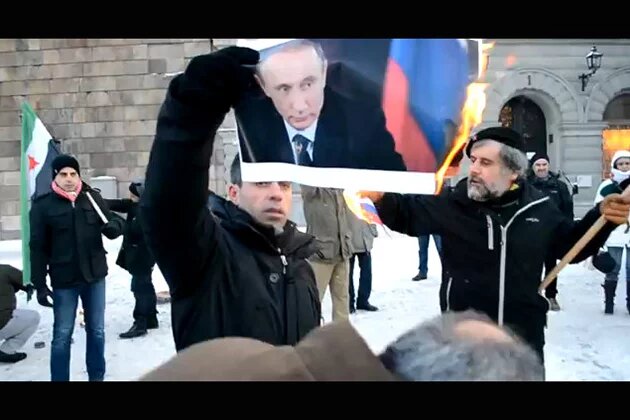
The killing of Zahran Aloush, leader of one of the strongest rebel group in Syria — Jaysh al-Islam — on 26 December, by a Russian airstrike shows again that Russia is willing to do whatever it takes to tip the balance of the conflict in favor of the Assad regime. The incident could have a significant impact on the dynamics of the conflict in Syria as well as on the upcoming negotiations on 25 January between the opposition and the Syrian regime as part of the Vienna talks. The international community should urgently start viewing Russia’s violations (which could amount to war crimes, according to Amnesty International) as a threat not only to Syrian civilians but also to all political efforts to end the conflict in Syria.
The Russian airstrike that killed Aloush, among other leaders from Jaysh al-Islam, targeting one of the group’s secret headquarters, was not an isolated incident; it was a part of a systematic effort to sabotage the Vienna talks. There has been a recent increase in attacks on Jaysh al-Islam since the group attended the recent opposition meeting in Riyadh in preparation for negotiations with the Syrian regime. Russia’s increased attacks on Jaysh al-Islam’s stronghold, Ghouta, in rural Damascus, is meant to incite pressure from other armed rebels and local communities to request the cessation of aerial attacks as a precondition for negotiations. The regime will of course not accept that condition, and will instead present Jaysh al-Islam with two options: lose its community support or become a political solution spoiler.
It seems, however, that Russia has adjusted its plan by directly targeting the group’s leaders, which makes its mission easier. By doing so, the group could either split over the selection of new leadership (it had been organized around Aloush’s charismatic figure) or retaliate by attacking Damascus and walk out of the talks.
Driving a wedge between the political opposition and the armed groups of Syria has become a priority for Russia since 116 diverse representatives reached an agreement to create a single negotiating body to represent them. Ahrar al-Sham and Jaysh al-Islam are among the strongest armed groups in Syria and their presence gave the meeting more weight. Ahrar al-Sham walked out before the meeting ended and was not signatory to the final statement, and since then Russia has been trying to find ways to get Jaysh al-Islam to walk out as well. If it does, the opposition will be in a weak position at the negotiating table with the regime.
The ironic coincidence here is that despite Russia’s claim that it’s fighting ISIS, it allowed Assad’s regime to strike a deal with ISIS fighters while Moscow is targeting the group that is fighting ISIS. On Saturday, the regime reached a deal with ISIS to evacuate more than 2,000 of its fighters and allies from the suburbs of Damascus to Raqqa. The deal, which will increase Assad’s chances of controlling these areas, is not the first time that Assad has cooperated with ISIS, it’s simply the first public one. The execution of the agreement was postponed due to ISIS’s concerns Jaysh al-Islam’s reaction to the killing of its leader.
The Russian intervention in Syria, apart form the verbal condemnations, hasn’t provoked strong reactions from opposition backers, but Aloush’s death may change that. Despite Russia’s systematic attacks against rebel groups backed by Saudi Arabia, Turkey and the US, the US has continued to perceive Russia as a rational player interested in achieving a political solution, and it considers Russian influence in Syria to Iranian. But Russia continues to prove that it play the bully to get what it wants regardless of the ramifications. As such, opposition backers — Saudi Arabia and Turkey, in particular — may start considering other options in the face of Russia’s support for Assad. This could change both the dynamics of the conflict on the ground as well as risk the failure of the negotiations before they even begin.
All political channels should be explored to stop the daily killing of Syrian civilians by preventing Russia from sabotaging any possibility of reaching a political solution in Syria. The recent Syrian National Coalition’s request to the Arab League to label the Russian intervention in Syria as an occupying force could be a good opportunity for regional and international actors to put political pressure on Russia’s intervention in Syria. Getting the UN Security Council to approve a list of terrorist groups in Syria and limit any foreign attacks to these groups could also help prevent destroying the progress achieved towards reaching a political solution.